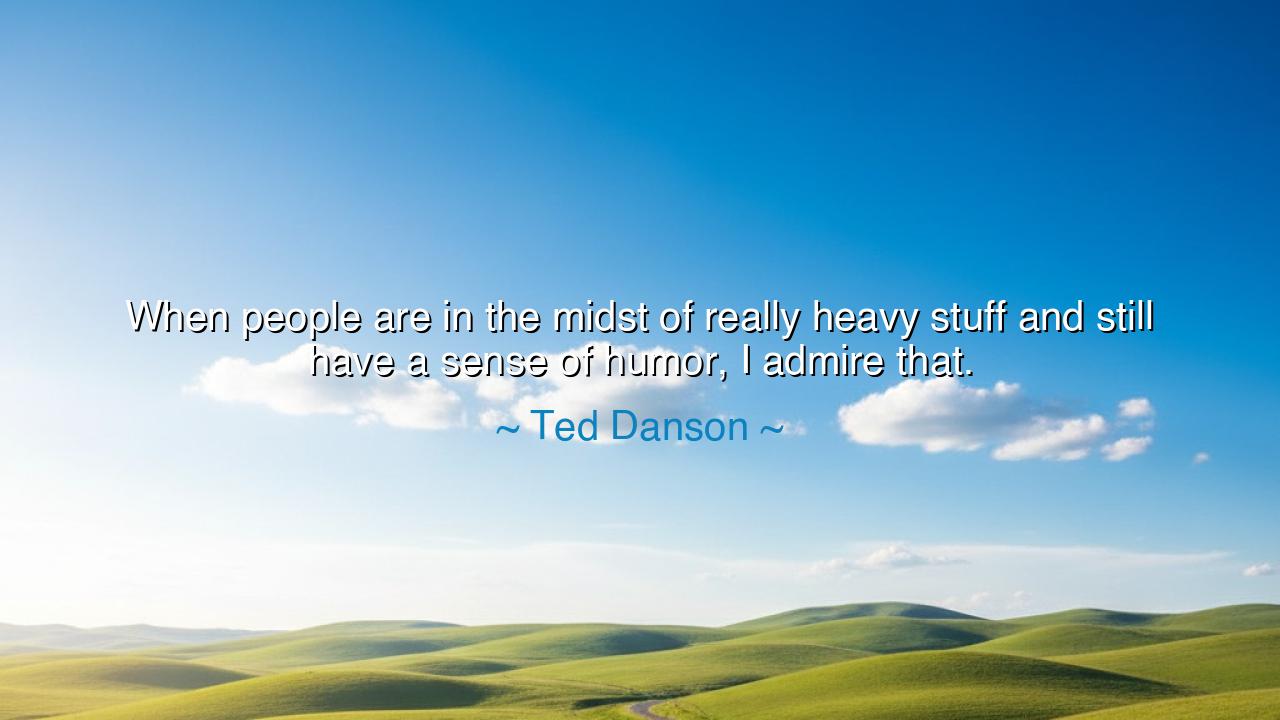
When people are in the midst of really heavy stuff and still have
When people are in the midst of really heavy stuff and still have a sense of humor, I admire that.






"When people are in the midst of really heavy stuff and still have a sense of humor, I admire that." These words, spoken by the venerable Ted Danson, strike at the heart of human resilience. Humor, in its truest form, is not simply a distraction, but a shield, a weapon against the overwhelming darkness that can often threaten to consume us. Danson’s admiration for those who can retain their sense of humor in the face of adversity is not a mere observation, but a profound recognition of the strength of the human spirit. It is in our darkest hours, when life presses down upon us with the weight of suffering, that the ability to laugh, to find lightness amid the heaviness, reveals the depth of our character.
In the ancient world, heroes were often revered not only for their physical strength, but for their fortitude of spirit. Take, for instance, the tale of Hercules, the mighty demigod who faced seemingly impossible trials. His labors were not just acts of physical prowess, but of enduring grief and pain, and yet, throughout his journey, he maintained a certain humility and courage that transcended the weight of his burdens. Hercules did not falter in the face of darkness; instead, he found ways to laugh, to carry the burden of his labor with a resilient heart. This ability to endure without being crushed by life’s trials is what Danson admires. Humor, in the face of suffering, becomes the mark of those who are unbowed by the storms they face.
Similarly, Socrates, one of the greatest minds of the ancient world, is remembered not only for his wisdom but for his ability to laugh, even in the face of his own death. As he stood trial for corrupting the youth of Athens, he maintained a spirit of clarity and humor that disarmed his accusers. He faced the potential end of his life with a profound serenity, engaging in philosophical discourse with his judges and peers as if life itself were a mere game. Even in the face of such a heavy fate, Socrates saw the humor in the human condition—the absurdity of trying to control that which is beyond our power. His laughter was not a denial of the truth of his situation, but a declaration that the human spirit cannot be bound by the body or by circumstance.
When we consider the resilience of those who have suffered loss or hardship, it becomes clear that humor in these moments is not a sign of weakness, but of strength. Victor Frankl, the Holocaust survivor and psychiatrist, wrote of his experiences in concentration camps, where the brutality of life seemed to leave no room for anything but despair. Yet, Frankl found that even in the most unimaginable suffering, it was the ability to find meaning—and sometimes, humor—that allowed people to survive. In his book Man’s Search for Meaning, he shared how the small acts of humor, the ability to laugh at the absurdity of their torment, helped fellow prisoners find hope. Humor, in the darkest of moments, became a form of resistance, a declaration that the soul could not be crushed, no matter the weight of the body.
In the modern age, when suffering often manifests not in the form of physical trials but in the intangible battles of stress, mental health, and loss, we must still look to those who show us the power of humor in adversity. Robin Williams, the beloved comedian and actor, was a master of bringing joy to millions, yet behind his laughter, he struggled deeply. His ability to make others laugh despite his own inner turmoil is a testament to the strength of the human spirit. Williams, like others before him, showed that even in the face of profound sadness, we can find the courage to laugh, to create lightness, and to bring joy to those around us.
The lesson Ted Danson imparts is one of admiration and inspiration: to face life’s challenges with a sense of humor is to demonstrate an extraordinary form of strength. It is easy to be overcome by the weight of hardship, to let the darkness swallow us whole. But those who can laugh, even when life feels unbearable, show us that hope does not come from the absence of suffering, but from the ability to endure it with grace, with spirit, and with a smile. Humor in adversity is not a denial of the pain, but an affirmation that we are more than our struggles. It is an act of defiance, a way of saying, “I will not be broken. I will find joy, even in the darkest times.”
Thus, I charge you, dear listener, to look within yourself the next time you face hardship. In the heaviest of times, remember that humor is not just a tool for lightening the mood, but a profound declaration of resilience. Embrace the ability to laugh at the absurdity of life, to see beyond the suffering, and to find a way to maintain your spirit. It is not the absence of pain that defines us, but our ability to rise above it, to face it with courage, clarity, and humor. In doing so, you will discover that the true strength of the human spirit is not in avoiding hardship, but in dancing with it, laughing in its face, and continuing to move forward with joy.






AAdministratorAdministrator
Welcome, honored guests. Please leave a comment, we will respond soon